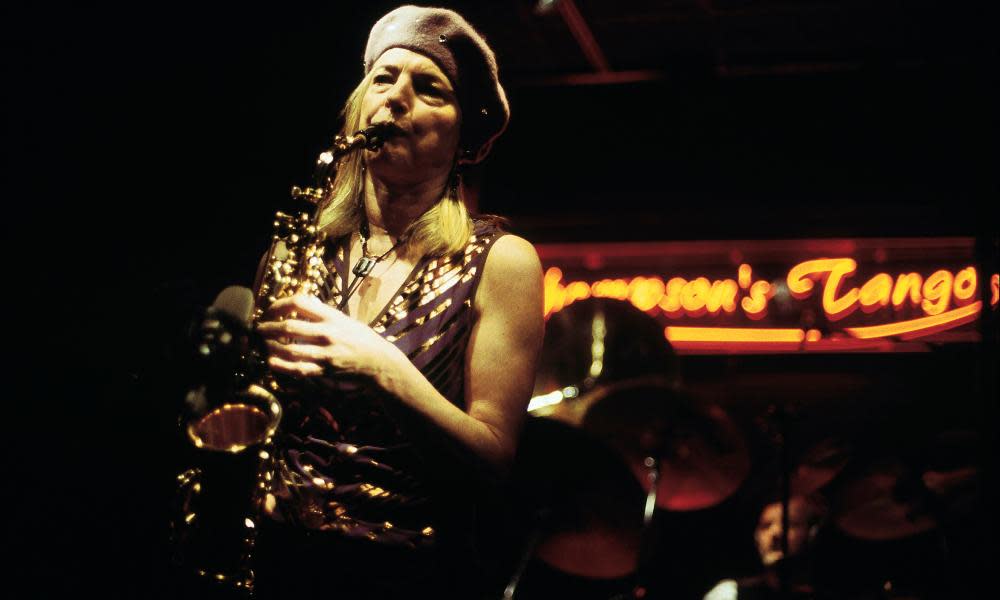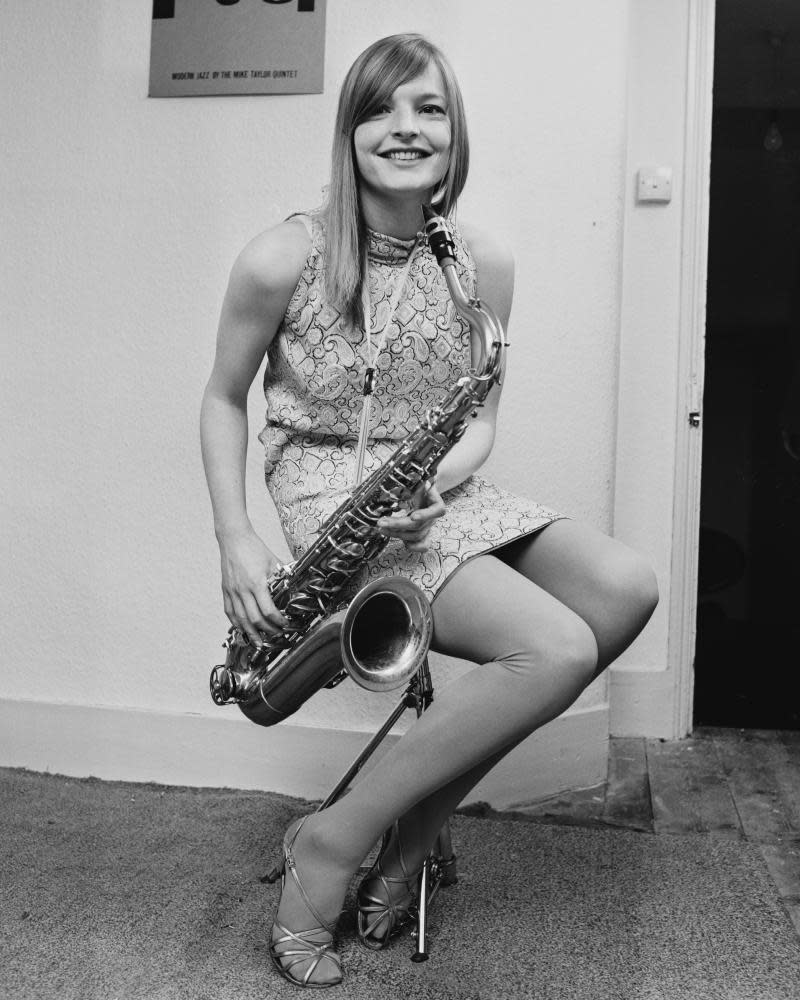Barbara Thompson obituary

The early 21st century’s fast-moving story of genre-fluid, culture-crossing musical innovation nowadays takes for granted the contributions of a growing cohort of powerful female saxophone players. But not so long ago, a woman was a startling rarity on an instrument whose evolution in modern music, from the 1920s onwards, had been almost exclusively driven by men. Barbara Thompson, who has died aged 77 of Parkinson’s disease, was one of the most inspirational exceptions.
Thompson’s formidable instrumental skills encompassed a tenor-saxophone voice that could range from the sensuous lyricism of Coleman Hawkins or Stan Getz to the power of John Coltrane’s turbulent soliloquies; nimble bebop fluency on the alto sax; and a dulcet-to-abstract tonal range on the flute. As a prolific composer, she wrote classical concertos and choral works, TV themes (including A Touch of Frost) and settings for poetry. She made friends and fans all over Europe (particularly in Germany), and across generations. The composer and trumpeter Yazz Ahmed, as part of her Polyhymnia project for International Women’s Day in 2015, composed a suite simply entitled Barbara in tribute to her formidable elder’s work and influence.
Barbara was born in Oxford, to Dick Thompson, later registrar of the court of criminal appeal, and Joan (nee Gracey), who had been a fellow Oxford University student before their marriage. The child was raised in London, first at Lincoln’s Inn Fields, and then in Notting Hill, where she attended the Fox primary school, and learned to play the recorder. Her parents separated when Barbara was six, and her refuge from loss and conflict was to study the fine details of musicmaking for hours.
At Queen’s College school in Harley Street (1955-62), she learned the clarinet and piano, and played for five years in the London Schools Symphony Orchestra. Then she spent a season with the Ivy Benson All Girl Band, having taken up the alto saxophone on hearing Johnny Hodges playing with Duke Ellington. At the Royal College of Music (1962-65), she studied the flute, piano, clarinet and composition while also taking private saxophone lessons.
In 1965, Thompson joined the New Jazz Orchestra (NJO), an adventurous big band led by Neil Ardley, and formed the previous year at the Green Man pub in Blackheath. Her jazz experience was still limited, but she learned fast and enthusiastically, especially in contact with the new music of such original local composers as Ardley, Michael Gibbs and Michael Garrick. Thompson and the NJO drummer, Jon Hiseman, began a relationship that became a marriage in 1967.
Thompson’s career gained momentum, both as a composer (her first published piece, for flute and piano, was written while she was still at college), and as a freelance. Between 1967 and 1971, she played in the all-female group She Trinity (playing the hefty baritone sax with them as the support act on some gigs by the Who), co-led a quintet with the saxophonist Art Themen, and worked with John Dankworth and Cleo Laine, Gibbs and Don Rendell. In 1972, Thompson formed the genre-splicing band Paraphernalia, with Hiseman joining later in the decade – changing incarnations of the group would continue as a vehicle for her composing for the next 40 years.
Thompson played saxes and flute alongside Hiseman’s jazz-rock quintet, Colosseum, on Andrew Lloyd Webber’s 1978 classical crossover album Variations, and she subsequently collaborated with Lloyd Webber on the musicals Cats and Starlight Express. From 1973 until 1980, she led Jubiaba, a nine-piece Latin-jazz group, and in the late 80s launched the big band Moving Parts. Throughout these years, she was also regularly a member of the international United Jazz and Rock Ensemble, a powerful outfit with a Europe-wide audience, and a lineup including the UK trumpeters Ian Carr and Kenny Wheeler, the German trombonist Albert Mangelsdorff, and the US saxist Charlie Mariano.
In 1992, to mark European Union Year, Thompson formed the all-acoustic sextet Sans Frontiers, which featured the Italian trumpet star Enrico Rava and the Polish violinist Michael Urbaniak.
She was appointed MBE in 1996. The following year, following concerns about her fingering, she was diagnosed with Parkinson’s disease. She continued to work, tour and record for the next four years, but was eventually forced to retire from active performance. In 2001, she told the Observer jazz writer Dave Gelly that, although medication could probably help her through a few years more: “I won’t play below my best.”

But medication improved, and Thompson did return to the stage for a 2003 tour with Colosseum, and for Paraphernalia gigs in Europe in 2005, recorded as Paraphernalia Live ’05. In 2007, she and Hiseman released the studio album Never Say Goodbye. By the end of the decade, Thompson was working on a piano concerto, the four-movement Quantum Leaps suite for the flautist Shona Brown, and the single-movement Perpetual Motion, for a 12-piece saxophone ensemble, and more. A BBC documentary directed by Mike Dibb, Playing Against Time, a sensitive study five years in the making and released in 2011, portrayed Thompson’s artistic and physical battles.
Thompson contributed to Colosseum’s swansong album, Time on Our Side, and toured again with the band in 2015. She finished work on Paraphernalia’s eclectic final album, The Last Fandango, with the Apollo Saxophone Quartet and Shona Brown guesting, and her own lyrically shapely and storytelling improv muse on both soprano and tenor saxes.
In 2018 Hiseman died following surgery to remove a brain tumour. Thompson witnessed a heartfelt celebration of the couple’s achievements at Shepherd’s Bush Empire the following year, featuring members of Paraphernalia and Colosseum, and their daughter, Anna (the singer-songwriter Ana Gracey). The National Youth Jazz Orchestra’s collaboration with the remaining active players of Paraphernalia on 10 Thompson originals was released in 2021 as the studio album Bulletproof.
Thompson is survived by her children, Marcus and Anna, and by two siblings, Hugh and Jane.
• Barbara Gracey Thompson, saxophonist and composer, born 27 July 1944; died 9 July 2022

 Yahoo News
Yahoo News 
